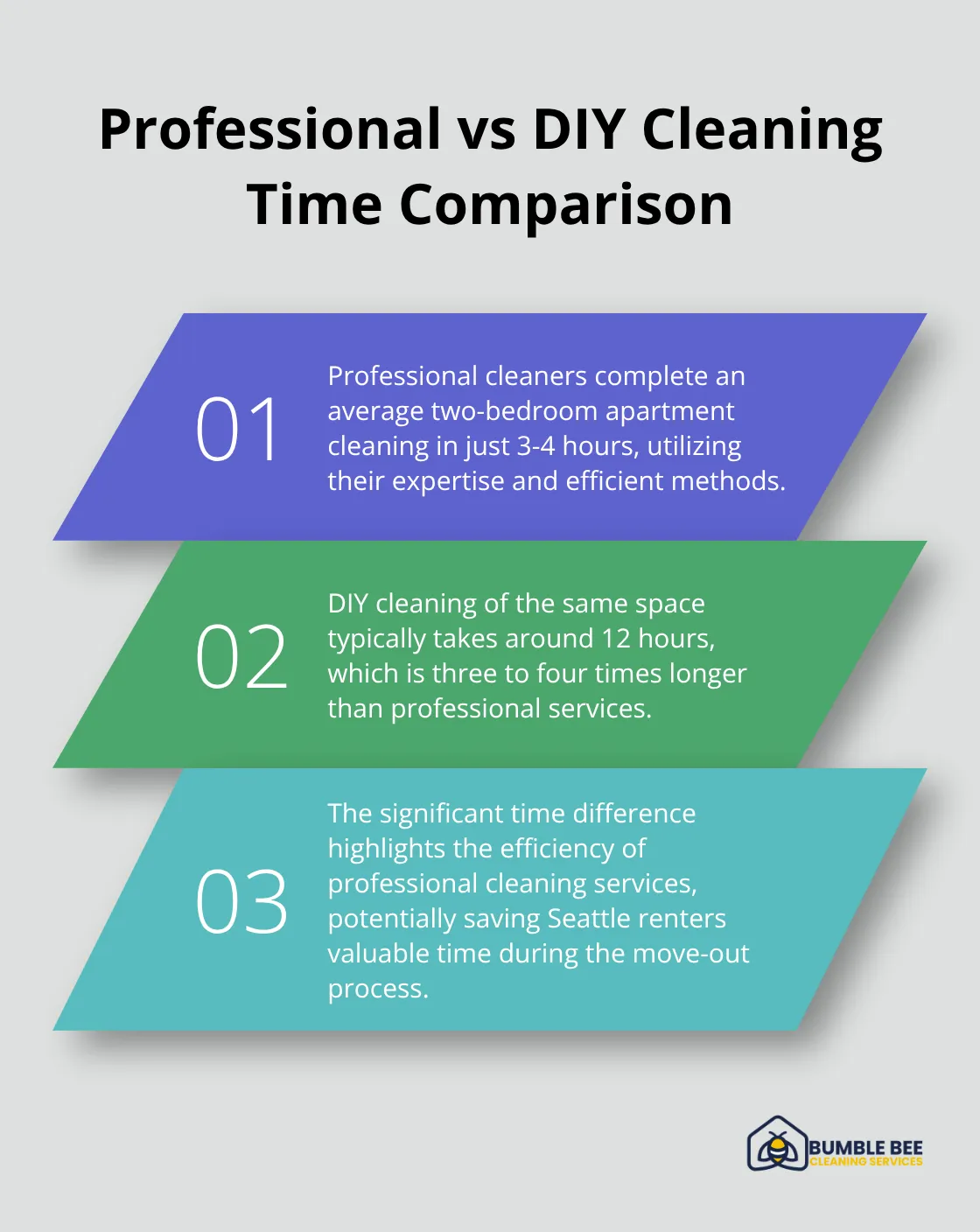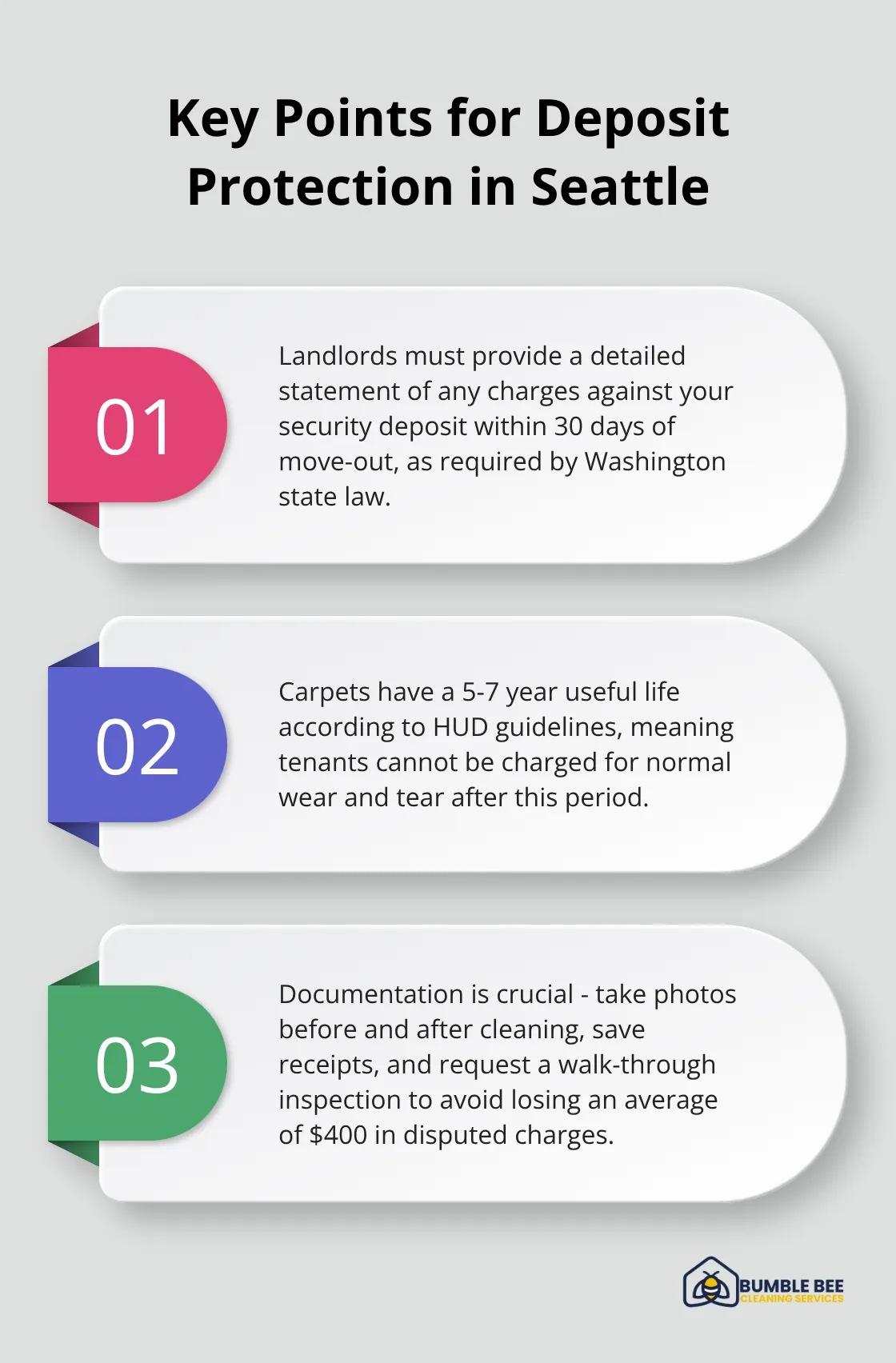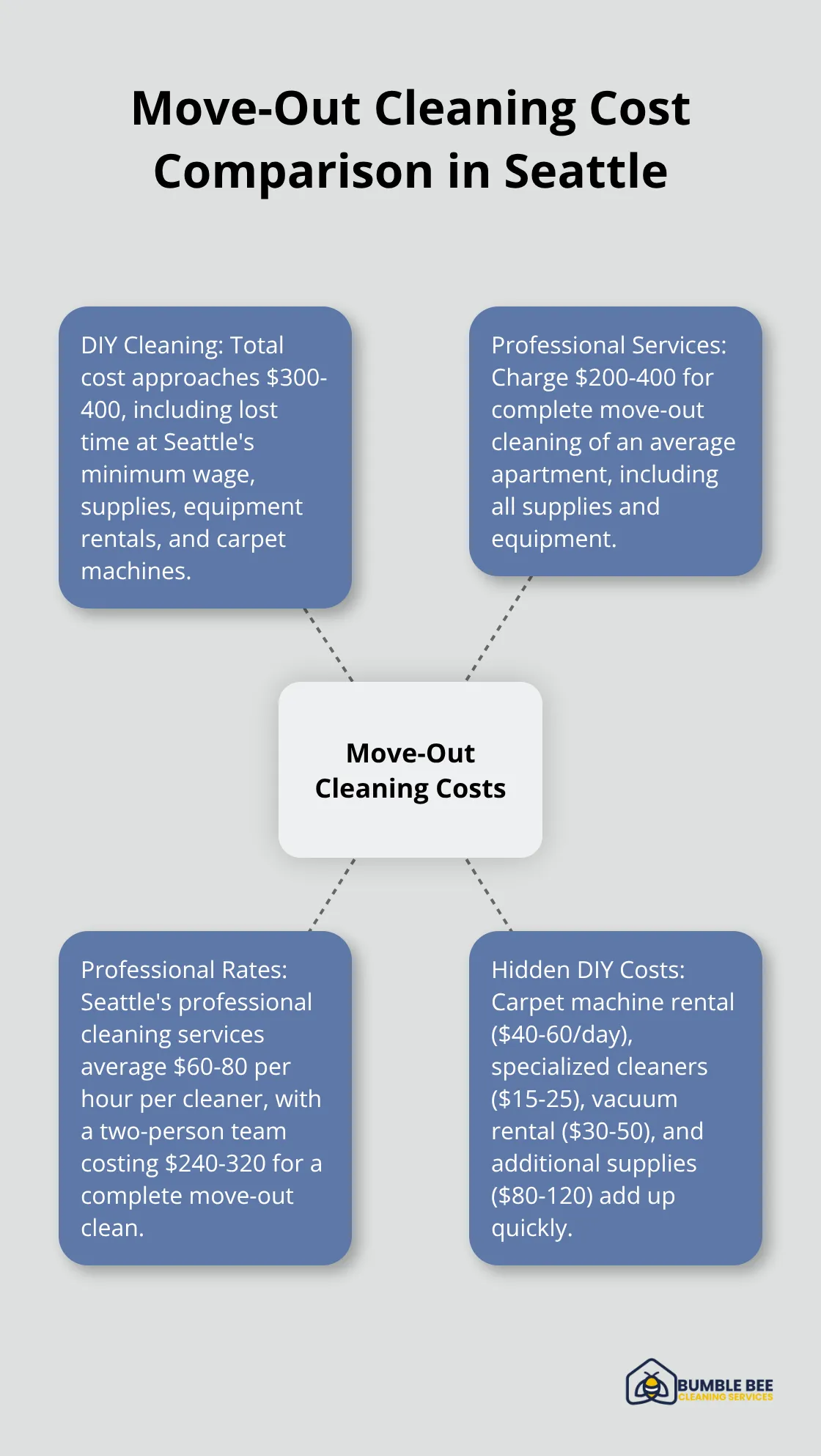Moving out of your Seattle rental requires more than just packing boxes. A thorough move-out checklist protects your security deposit and meets Washington state requirements.
We at Bumble Bee Cleaning Services see tenants lose hundreds of dollars because they missed key cleaning tasks. This guide covers every room, local regulations, and professional cleaning options to help you get your full deposit back.
What Cleaning Tasks Actually Get Your Deposit Back
Kitchen Deep Cleaning Standards
Kitchen cleanliness issues are a major concern for property managers, as the property management market continues to grow with a projected CAGR of 3.94% between 2025 and 2029. Your oven needs complete degreasing inside and out. Remove the bottom drawer to clean underneath the appliance. Empty, defrost, and sanitize your refrigerator with all shelves removed and washed separately.
Kitchen cabinets require interior wiping to remove crumbs and spills. Run your dishwasher through a cleaning cycle with specialized cleaner. Seattle landlords specifically check behind appliances where grease accumulates, so pull out your stove and refrigerator to clean the walls and floors underneath.
Bathroom Restoration Requirements
Bathrooms demand complete sanitization with special attention to mineral deposits common in Seattle’s hard water. Mix equal parts white vinegar and water to remove stubborn buildup on faucets and showerheads. Scrub tile grout with a stiff brush and bleach solution.
Replace any severely discolored caulk around tubs and showers. The toilet needs complete disassembly cleaning including behind the base and inside the tank. Exhaust fans collect significant dust and require removal of the cover for thorough cleaning.
Living Areas and Bedroom Priorities
Carpets represent the highest-value cleaning decision in your move-out process. The Carpet and Rug Institute states that carpets have a 5-7 year lifespan, meaning tenants cannot face charges for normal wear after this period. However, stains and odors require professional steam cleaning (costing $150-300).
Dust ceiling fans and light fixtures first before you clean lower surfaces to prevent re-contamination. Fill nail holes with spackling compound and sand smooth when dry. Window cleaning inside and out significantly impacts final inspections, as dirty windows immediately signal poor maintenance to landlords.
Time Management and Professional Standards
Seattle’s specific climate creates unique challenges that affect your cleaning timeline. The city’s humidity can cause mold growth in overlooked areas, while frequent rain leaves mineral deposits on windows. Professional cleaners understand these local conditions and complete an average two-bedroom apartment in 3-4 hours (compared to 12 hours for DIY cleaning).
These standards directly connect to Washington state’s legal requirements and tenant protection laws that govern your deposit return.

What Seattle Laws Really Protect Your Deposit
Washington state law grants you specific rights that most tenants don’t fully understand, and this knowledge directly impacts how much money you get back. Landlords must provide a full and specific statement that details any charges against your security deposit within 30 days of move-out. The Goodeill v. Madison Real Estate case established that vague descriptions like general fees won’t hold up – landlords need invoices, estimates, and detailed explanations of what portion of damage you actually caused versus normal wear and tear.
Normal Wear and Tear Protection
The U.S. Department of Housing and Urban Development sets clear guidelines that carpets have a 5-7 year useful life, which means you cannot face charges for standard carpet care or replacement in older units. House Bill 1074 strengthened tenant protections and requires landlords to provide written checklists that describe the home’s conditions. Without proper documentation, they cannot charge you for damages. Seattle landlords frequently try to charge for paint touch-ups, but normal scuff marks and nail holes from pictures fall under protected wear and tear.

Documentation That Wins Disputes
Take photos of every room before you start and after you finish, with focus on areas landlords commonly dispute like kitchen appliances, bathroom fixtures, and carpet conditions. Save all receipts from supplies and professional services – these prove your good faith effort to maintain the property. Request a walk-through inspection with your landlord present, and get any agreed-upon issues in written form. Seattle’s rental market moves fast, but you skip this documentation step at your own risk (tenants lose an average of $400 in disputed charges according to local tenant advocacy groups).
Professional Standards vs Legal Requirements
While Washington state protects you from excessive charges, landlords still expect properties to meet specific standards that go beyond basic legal requirements. Professional services understand these expectations and can bridge the gap between what the law requires and what actually gets your deposit back.
Should You DIY or Hire Professionals for Move-Out Cleaning
The math behind move-out cleaning reveals a stark reality that most Seattle tenants ignore until it’s too late. DIY cleaning requires significant time investment, which translates to $207 in lost time at Seattle’s minimum wage of $17.27 per hour. Add supplies, equipment rentals, and carpet machines, and your total DIY cost approaches $300-400. Professional services charge $200-400 for the same work but complete it in 3-4 hours with industrial-grade equipment that produces superior results.
Cost Analysis That Changes Everything
Seattle’s professional rates average $60-80 per hour per cleaner, which makes a two-person team cost $240-320 for a complete move-out clean of an average apartment. This price includes all supplies and guarantees work quality that meets landlord expectations. The hidden DIY costs add up fast: carpet machine rental costs $40-60 per day, specialized oven cleaners cost $15-25, and quality vacuums for deep work cost $30-50 to rent. Most tenants underestimate supply costs and end up with $80-120 in products they’ll never use again.

When Professional Services Become Mandatory
Certain situations make professional help the only viable option for deposit protection. Properties with pet odors require ozone treatment and enzymatic cleaners that cost $200-300 to rent. Homes with significant grease buildup, mold issues, or hard water stains need industrial degreasers and acid-based cleaners that require professional handling (these products can damage surfaces if misused). Seattle’s humid climate creates mold problems that DIY methods cannot address effectively, and attempts to remove it yourself can spread spores throughout the property.
Quality Standards That Guarantee Results
Professional cleaners understand Seattle landlord expectations and use checklists that align with local inspection standards. Teams complete systematic room-by-room work that addresses every surface landlords inspect, while DIY efforts typically focus on obvious areas and miss the details that trigger deposit deductions. Professional services address areas like inside appliance seals, window tracks, and exhaust fan interiors where dust accumulates (places most tenants never think to check).
Final Thoughts
Your move-out checklist success depends on precise timing and execution standards that protect your security deposit. Start the process two weeks before your move-out date and focus on deep tasks like oven degreasing and carpet treatment first. Schedule your final walk-through inspection 48 hours before you return keys to address any landlord concerns.
Professional services provide guarantees that DIY methods cannot match. We at Bumble Bee Cleaning Services complete move-out tasks in 3-4 hours with industrial-grade equipment that meets Seattle landlord expectations. Our team uses eco-friendly products and follows systematic checklists that address every surface landlords inspect.
The investment in professional move-out cleaning pays for itself through deposit protection. Seattle tenants who skip professional services lose an average of $400 in disputed charges (while our clients consistently receive full deposit returns). Book your service early, document everything with photos, and follow Washington state requirements for maximum deposit protection.
